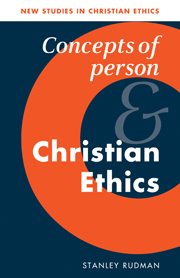Book contents
- Frontmatter
- Contents
- General editor's preface
- Acknowledgements
- List of abbreviations
- Introduction
- PART I ‘PERSON’ IN CONTEMPORARY ETHICS
- PART 2 ‘PERSON’ IN CHRISTIAN PERSPECTIVE
- 7 The relevance of history and Christology
- 8 Divine embodiment and temporality: is God a person?
- 9 Divine and human: relationality and personhood
- 10 Religion and morality: personhood, revelation and narrative
- PART 3 IMPLICATIONS FOR A CHRISTIAN ETHIC
- Conclusion
- Notes
- Select bibliography
- Index of subjects
- Index of names
10 - Religion and morality: personhood, revelation and narrative
Published online by Cambridge University Press: 02 December 2009
- Frontmatter
- Contents
- General editor's preface
- Acknowledgements
- List of abbreviations
- Introduction
- PART I ‘PERSON’ IN CONTEMPORARY ETHICS
- PART 2 ‘PERSON’ IN CHRISTIAN PERSPECTIVE
- 7 The relevance of history and Christology
- 8 Divine embodiment and temporality: is God a person?
- 9 Divine and human: relationality and personhood
- 10 Religion and morality: personhood, revelation and narrative
- PART 3 IMPLICATIONS FOR A CHRISTIAN ETHIC
- Conclusion
- Notes
- Select bibliography
- Index of subjects
- Index of names
Summary
We are now in a better position to examine how a theological ethic can take account of both divine and human personhood. In the present chapter we examine some of the important theoretical issues involved in the development of moral practices based on faith commitments. How do religious believing and belonging influence conduct? These issues are not new, but they are articulated from a fresh perspective in relation to our understanding of divine and human personhood within a religiously plural society. The chapter deals with the relation of religion and morality in terms of: the influence of religion on the content and context of morality and the scope of revelation; the significance of the human subject in morality; and narrative ethics. We develop the idea that the cultural and religious narratives which are to be found in the major world faiths can serve to qualify our shared humanity. Being qualified or distinguished in this way does not detract from a common humanity and shared rationality. Faith commitments do not erase or replace reason; on the other hand, the activities of reason and the shape and content of morality may be influenced and even determined by religious narratives.
The relation of religion and morality is sometimes discussed as if it were a matter of logical priority or derivability. Whether an action is right because God wills or commands it, or whether God commands or wills it because it is right, is a dilemma often associated with Plato's Socratic dialogue, Euthyphro.
- Type
- Chapter
- Information
- Concepts of Person and Christian Ethics , pp. 190 - 222Publisher: Cambridge University PressPrint publication year: 1997



